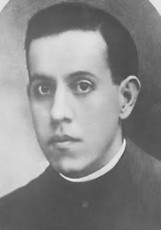Catholic Blesseds, Saints, Solemnities & Holy Days

Blessed Miguel Pro
Feast Day: November 23
Patronage: Courage, clandestine priests, and persecuted Christians
Blessed Miguel Agustín Pro (1891–1927) was a Mexican Jesuit priest and martyr known for his courage, wit, and unwavering faith during the violent anti-Catholic persecutions of the Mexican government. Despite the risk of death, he ministered to the faithful in secret, offering sacraments, support, and hope to those in need. His bravery and joyful spirit inspired countless Catholics, even as he faced martyrdom. Miguel Pro’s life exemplifies a fearless dedication to Christ and the Church.
In the 1920s, Mexico was gripped by fierce anti-Catholic persecution under the Plutarco Elías Calles government. Churches were closed, priests were hunted, and public worship was outlawed. Despite the dangers, Miguel Pro returned to Mexico after being ordained a Jesuit priest in Europe. Determined to minister to the oppressed faithful, he devised creative ways to serve them, often donning disguises to avoid detection.
Disguised as a businessman, mechanic, or beggar, he would slip into homes to celebrate Mass, hear confessions, and bring the Eucharist to those in hiding. On one occasion, while dressed as a police officer, he walked past government officials with consecrated hosts hidden on his person, a testament to his ingenuity and courage.
Miguel Pro’s acts of faith extended to the final moments of his life. Arrested under false charges of an assassination attempt, he faced a mock trial and was sentenced to execution. On November 23, 1927, he refused a blindfold and stood with his arms outstretched in the form of a cross, crying out, “Viva Cristo Rey!” (“Long live Christ the King!”) before being shot. His martyrdom became a rallying cry for persecuted Christians and a symbol of hope in the face of oppression.
For leaders and believers, Miguel Pro’s life reminds us to stand firm in faith, even when faced with great challenges. His joyful courage and creative problem-solving demonstrate that perseverance and trust in God can overcome fear and adversity.





